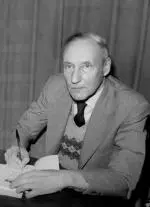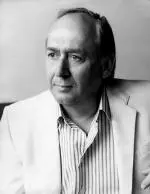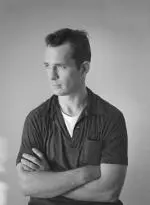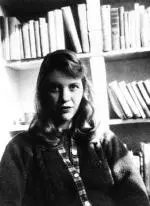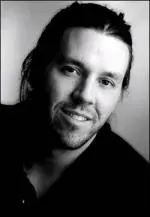Discovering your idols have feet of clay is rarely a total disappointment. Prone as we are to erecting statues to those we admire, we’re also only a misplaced tweet away from tearing down those same statues and reducing them to tiny pieces. In today’s social-media-penetrated-world, the business of myth destruction is easy. Canny celebrities hire specialists to manage their twitter accounts, but the separation between our gods and ourselves has never been thinner, or easier to breach.
Perhaps that’s why the myths that are most enduring are those which cling to the writers of the past. Would Poe’s admirers feel the same about their hero if he posted his terrible poems on his blog? Or stuffed his FB wall with raven memes?
Perhaps not. The myths which endure the longest are those unchallenged by a sobering dose of reality, and for that reason, it’s easier to idolize the dead than the living. But even the departed aren’t immune to the spotlight of truth.
![]() William S Burroughs – Trustafarian
William S Burroughs – Trustafarian
It was a tiny cameo, but no one who saw Drugstore Cowboy will forget it. Ravaged, magnificent; Burroughs as Tom the Priest in Gus van Sant’s film adaptation of the James Fogle book expounds on the healing power of narcotics, separates sissy drugs from the hard stuff, and generally holds court against a backdrop of seedy hotels and street corners. This is Burroughs as we imagine him: the unrepentant libertine, existing in noble squalor, willing to accept the degradations of poverty imposed by a lifelong commitment to addiction.
The truth is a little different. Burroughs came from money, the grandson of an inventor who patented and produced an adding machine. Coy about his inheritance, Burroughs claimed ‘…it gave me a little money, not much, but a little.’
It gave him a monthly allowance for life: His parents, who sold their interest in the family business, handed over part of their capital to their youngest son. The money freed Burroughs from the burden of having to earn a living. Burroughs liked to claim that shooting his wife in the head during a misconceived game of William Tell made him a writer. It might be closer to the truth to say that the security of those few hundred dollars a month gave him the chance to write.
![]() JG Ballard - Househusband
JG Ballard - Househusband
Unlike Burroughs, Ballard did not enter the writing profession equipped with a financial cushion, giving up the security of a medical career to pursue his literary dreams. But Burroughs was an influence; the brooding presence behind the surreal and disturbing landscapes of Ballardian epics such as The Atrocity Exhibition and Crash.
Fans (like me) could be forgiven for expecting Ballard to resemble his mentor in other ways: an omnisexual consumer of industrial quantities of drugs, a habitué of rundown bars and rooming houses, a dabbler in the darkest corners of human experience.
Ballard was no such thing. Left to raise two small children after the sudden death of his wife, Ballard made an unswerving commitment to suburban domesticity. Like many women writers, he fitted in his work around household chores and childcare. His only vice was to relax with a whisky and some classical music once the kids were safely in bed. He tried LSD precisely once and found the experience so harrowing that it put him off any kind of drugs, including aspirin, for life.
![]() Jack Kerouac – Mummy’s Boy
Jack Kerouac – Mummy’s Boy
We all know how Kerouac left New York in the summer of 1947 and hitchhiked to Denver to be with his friend Neal Cassady. We all know this because Kerouac immortalized the experience in On the Road, and this is a book we have all, at some point in our early twenties, read. And sometimes, with varying degrees of discomfort and peril — my own experience of hours on a gritty bypass only to be given a lift by a truck driver who liked reciting his own poetry is doubtless typical — imitated.
Aware that On the Road is substantially biographical, it’s hard not to assume that the freewheeling lifestyle that Kerouac depicts is a fair representation of the rest of his life. We imagine him perpetually on the verge, thumb extended, ready for his next adventure; scribbling his experiences in a worn notebook or on the back of menus. We know he must have come down to roost occasionally, but imagine him couch surfing his way around New York, usually in the company of the rest of the Beats. We imagine him fearless, unrestrained, rootless and free.
We do not imagine him tied to the apron strings of Mama.
Yet apart from those trips, that’s how Kerouac spent the rest of his life. A devout Catholic, he felt responsible for taking care of the widowed Gabrielle, but in practice this meant not only buying her a house, but living with her in that same house, even during his brief attempts at marriage. On a visit to their place in Northport, Gabrielle told the journalist Alfred Aronowich, ‘I’ll tell you right now, he always lives with me, outside of when he travels. Once in a while he takes off, visits his friends, he goes on a ship. But he always comes back.’ For his part, Kerouac once said, ‘Gabrielle was the only woman I ever really loved.’
![]() Sylvia Plath – Pain in the Ass
Sylvia Plath – Pain in the Ass
Most great writers have fans. Some great writers have fanatics. Sylvia Plath is one of these. Relatively obscure at the time of her suicide in 1963, Plath quickly became the figurehead for the Andrea Dworkin generation: young women arriving at adulthood in the 1970s, armed with the contraceptive pill, an education and a burning conviction that Men were The Enemy.
Plath killed herself after her marriage to Ted Hughes — poster boy for poetry’s 1960s New Wave — broke down. A decade later and her grave had become a shrine for young women who felt Plath had fallen victim to the oppressive forces of the patriarchy and who liked to express this by chiseling the ‘Hughes’ from her headstone.
What Plath felt about all of this we will never know, but it is clear that most of those same young women might have found the reality of Plath in person much less invigorating than the ideal. Biographies are tactful, but read between the lines and listen to the interviews with those who knew her and a picture emerges of a person who was best in very small (possibly microscopic) doses. Here’s one example: while Plath and Hughes were on honeymoon, he decided to go for a walk on his own. She wanted to come with him. He needed some space. They came to a compromise: Hughes could go for his walk, but only if Plath followed him, at a distance. Fatal Attraction anyone? Plath drew the line at bunny boiling, but she did on more than one occasion reduce her husband’s manuscripts to shreds because he had pissed her off. As one friend put it, ‘she had a blind spot about cause and effect.’ That blind spot meant she tried the patience of others to its limits and it’s hard to blame Hughes and those close to her when eventually their tolerance snapped.
![]() David Foster Wallace – Not Quite a Genius
David Foster Wallace – Not Quite a Genius
There are two ways to react to overpraise:
1. See it for what it is;
2. Believe it.
When Esquire called Infinite Jest ‘a work of genius’ and the Atlantic dubbed its author ‘a wild card savant’, it’s not all that surprising that instead of choosing the sober, well considered Option #1 as his response, David Foster Wallace chose the forgivable and more usual path of believing every word they said.
When actors and musicians hit the big time, they like to get wasted, usually in public and in the company of a gaggle of acolytes. Some writers go the same route (here the name of Easton Ellis floats into view), but mostly writers shun the company of others and must therefore find other outlets for their newfound status as demigods.
Wallace chose to express his by believing that writing fiction with a tangential connection to mathematics meant he actually understood the mathematics. In his next full length work, Everything and More: a Compact History of Infinity, Wallace the writer became Wallace the interpreter of mathematical theory. But as someone once put it, to interpret science for non-scientists, you need to understand the subject in question about nine times better than everyone else. Wallace, for all his undoubted smarts, simply hadn’t done enough time at the coal face. His work was not only riddled with errors, immediately seized upon and exposed by real mathematicians, he adopted a gratingly lofty tone: ‘Mathematically speaking, the truth about the Continuum Hypothesis is more complicated than pop writers let on,’ he intones, oblivious to the possibility that he might (avert your eyes children) actually be one of those pop writers himself!
Everything and More, despite its flaws, sold well, but it exposed Wallace as an amateur, and an amateur, however gifted, is not the same as a genius.
It’s good, perhaps necessary, to have figures to admire, but as the next best seller rolls into town and we’re invited to believe that its author is capable not only of writing a good book but also of turning water into wine and reviving the dead, this list might help us all remember that reputations are often much bigger than the people behind them.

About the author
Cath Murphy is Review Editor at LitReactor.com and cohost of the Unprintable podcast. Together with the fabulous Eve Harvey she also talks about slightly naughty stuff at the Domestic Hell blog and podcast.
Three words to describe Cath: mature, irresponsible, contradictory, unreliable...oh...that's four.
